Learning Materials
How to write an interview essay: complete guide.


Updated: Apr 19, 2024

Ever wondered how to transform a simple conversation into a compelling narrative? Writing an interview essay can seem daunting, especially when you're unsure where to start or how to make it engaging. An interview essay should effectively present the interviewee's thoughts on selected topics, using a structured format that combines direct quotes, paraphrasing, and your own analysis to enrich the content. This guide will walk you through the entire process of creating an interview essay, from structuring and formatting to selecting the right questions and crafting a narrative that resonates with readers.
Generate essays with Samwell.ai
The process of writing an interview essay: an overview.
Writing an interview essay involves more than just transcribing conversations. It requires a thoughtful approach to select, organize, and present the interview content in a way that tells a compelling story. Starting with a clear understanding of the essay's purpose, writers need to decide on the format—narrative, Q&A, or a thematic exploration. This choice will significantly influence the structure and presentation of the interview content, guiding the entire writing process from the questions you ask to the way you interpret the answers.
Preparation is key in crafting an effective interview essay. Before even beginning the interview, it's crucial to research the interviewee and the topic thoroughly to ask insightful questions that elicit meaningful responses. Organizing these findings into a structured outline will help streamline the writing process, ensuring that the essay remains focused and coherent. The outline should include an introduction that sets the stage, a body that delves into the interviewee's perspectives, and a conclusion that ties everything together and reflects on the insights gained.
Outlining Your Interview Essay: A Structured Approach
Creating a structured outline for your interview essay is essential as it acts as your writing roadmap. Start with an introduction that presents your thesis statement and gives a brief overview of the interviewee. The body should be divided into several paragraphs, each focusing on a different theme or topic discussed during the interview. Finally, conclude with a summary that reiterates the main points and reflects on the overall insights. This structured approach ensures that your essay is organized and maintains a logical flow from start to finish.
Formatting Guidelines for an Interview Essay

Adhering to specific formatting guidelines is crucial in crafting a well-organized interview essay. Typically, your essay should start with an introduction that hooks the reader and introduces the interviewee. The body of the essay should follow the outline, using clear headings for each section if necessary, and include direct quotes and paraphrases from the interviewee. In terms of presentation, use a readable font, double-spacing, and include page numbers. Always cite your sources correctly to avoid plagiarism and enhance the credibility of your essay.
Dos and Don'ts in Writing an Interview Essay

When writing an interview essay, there are several best practices to follow and pitfalls to avoid. Do ensure clarity by using simple language and avoiding jargon that might confuse readers. Do maintain the authenticity of the interview by accurately representing the interviewee's responses. Don't manipulate quotes to fit your narrative, as this can mislead readers and take away from the interviewee's intended message.
Additionally, do focus on creating a narrative that engages readers, weaving quotes and insights into a compelling story. Don't overlook the need for thorough editing to polish your essay and enhance readability. Avoid overly long paragraphs that can deter readers, and ensure your paragraphs transition smoothly to keep the reader engaged from start to finish. Following these guidelines will help you craft an insightful and respectful interview essay that is both informative and enjoyable to read.
Crafting an Engaging Introduction for Your Interview Essay
Crafting an engaging introduction is crucial for capturing the reader's interest right from the start of your interview essay. Start with a hook that grabs attention; this could be a startling statistic, a poignant quote from the interviewee, or an intriguing question that sets the stage for the narrative. The goal is to pique the reader's curiosity and draw them into the story you're about to unfold, making them eager to learn more about the interviewee and the insights they have to offer.
Once you've captured the reader's attention, it's important to provide a brief overview of the interviewee and the main themes of the essay. This not only introduces the subject but also sets the tone for the rest of the essay. Include a compelling thesis statement that outlines the central idea or the primary insight the interview will explore. This approach ensures that your introduction serves as a concise roadmap for the readers, guiding them through the insights and narratives that will be developed in the body of the essay.
Concluding Your Interview Essay Effectively
Concluding your interview essay effectively is key to leaving a lasting impression on your reader. Summarize the main points and insights shared by the interviewee, reflecting on how they contribute to the broader topic or issue at hand. It's crucial to restate your thesis in a way that reflects the discussions and revelations from the interview, providing closure and reinforcing the significance of the interviewee's perspectives. Consider ending with a thought-provoking question or statement that encourages readers to think deeply about the subject, thereby extending the impact of the essay beyond its final words.
Enhancing Your Interview Essay with Narrative Style
To elevate your interview essay from a mere transcript to a vivid narrative, it's essential to embrace a narrative style. This approach involves weaving the interviewee's responses into a storyline that resonates with readers. By focusing on the flow of events and the emotional journey of the interviewee, you can create a more immersive experience. This style not only keeps the readers engaged but also allows them to connect deeply with the subject matter, seeing the interviewee not just as a source of information, but as a character in a compelling story.
Utilizing narrative techniques such as dialogues, descriptive details , and personal anecdotes can significantly enhance the readability and impact of your interview essay. These elements help to paint a vivid picture of the interviewee and their experiences, making the story come alive. Moreover, integrating direct quotes strategically throughout the essay adds authenticity and gives a voice to the narrative, allowing readers to experience the interviewee's personality and emotions firsthand.
Choosing the Right Questions for Your Interview
Selecting the right questions for your interview is crucial in crafting a narrative that captures the essence of the interviewee's experiences and perspectives. Focus on open-ended questions that encourage detailed responses, and consider how each question will contribute to the unfolding story. Here are a few tips:
- Ask about specific life events that shaped the interviewee's viewpoint.
- Inquire about challenges and successes to reveal depth and personal growth.
- Tailor questions to evoke emotions and personal reflections, which enrich the narrative.
By carefully choosing questions that align with the narrative style of your essay, you can gather compelling content that engages and resonates with your audience.
Elevate Your Interview Essay with Samwell.ai's Writing Tools
Elevating your interview essay becomes seamless with Samwell 's advanced AI-powered writing tools. Whether you're a student or a professional, Samwell ensures that your essay adheres to the highest standards of academic integrity. The AI assistant helps you integrate direct quotes and paraphrases accurately, ensuring that each citation is formatted correctly according to your specified style, be it APA, MLA, or Chicago. This meticulous attention to detail not only enhances the credibility of your essay but also saves you valuable time.
Moreover, Samwell 's advanced plagiarism checks are integral to maintaining the originality of your work. Here’s how it benefits you:
- Scans your essay against a vast database to detect any potential plagiarism.
- Highlights sections that require rephrasing to ensure uniqueness.
- Provides suggestions for citations to fortify your claims and avoid academic misconduct. This feature of Samwell not only protects your academic reputation but also instills confidence in your writing, allowing you to submit your interview essay with peace of mind.
Frequently Asked Questions
How do you start an interview essay.
Starting an interview essay effectively involves crafting an engaging introduction. Begin with a hook that grabs the reader's attention, such as a startling statistic, a poignant quote, or an intriguing question. Follow this with a brief overview of the interviewee and the main themes of the essay, and include a compelling thesis statement that outlines the central idea or primary insight the interview will explore.
How to start writing an interview?
To start writing an interview, first ensure you have a clear understanding of the essay's purpose and decide on the format—narrative, Q&A, or thematic exploration. Prepare by researching the interviewee and the topic thoroughly to formulate insightful questions. Organize your findings into a structured outline with an introduction, body sections based on themes, and a conclusion. This preparation sets the foundation for writing an engaging and coherent interview essay.
How do you summarize an interview in an essay?
To summarize an interview in an essay, focus on condensing the main points and insights shared by the interviewee. Reflect on how these contribute to the broader topic or issue at hand. Restate your thesis in a way that reflects the discussions and revelations from the interview, providing closure and emphasizing the significance of the interviewee's perspectives. Consider ending with a thought-provoking question or statement to extend the impact of the essay.
Most Read Articles

Your Guide to Help Writing a Essay Successfully
Expert tips for help writing a essay - from crafting a thesis to structuring your essay effectively..
How to Write Critical Thinking Essay: Expert Tips
Expert tips for writing a critical thinking essay. learn how to structure, choose topics, and use evidence effectively.'.

How to Write a Good Hook: A Step-by-Step Guide
Master the art of crafting a good hook with our guide. create compelling openers for a memorable first impression..

Ultimate Guide to Writing Tips: Enhance Your Skills Today
Discover a variety of writing tips in our ultimate guide to elevate your skills today, start writing your free essay.
How to Write an Interview Essay Without Mistakes and Succeed
Table of contents
- 1.1 The Main Purpose of Writing an Interview Essay
- 2 Choose an Interview Format Correctly: Interview Essay Outline and Interview Essay Introduction
- 3 Getting Ready for the Interview
- 4 Conducting the Interview: Rules
- 5 How to Organize Your Interview Essays Paper Findings?
- 6 An Interview Paper Outline Matters
- 7 Writing the Interview Essay
- 8.1 Revising and Proofreading Aspects
What Are Interview Essays?
If you have been asked to learn how to write an interview essay for your school or college assignment, you will be able to find all the necessary information here. Before we continue with the rules, requirements, and formatting, let’s take time to see what interview essays represent. Basically, they are meant to provide readers with general information about the essence of the interview and their thoughts on a certain topic(s). While this is not always the case, a good interview essay must offer a chance to have a deeper insight into the analysis and evaluation of the given responses within a specified research context.
An interview essay is a task to check your data collection skills and organize all the information gained. While it may seem overly complex initially, the hardest part is to start and introduce an individual correctly. You have to understand why you are conducting an interview and ensure you are prepared well before you start writing.
The Main Purpose of Writing an Interview Essay
It will depend on your subject and even the target audience. This means you must understand your scientific purpose before writing an interview essay. The same is true for all the work that lies ahead. An interview has to provide background information about your subject and outline the subjects and matters you address. First, the target audience must be inspired and interested in your take. It has to happen in your interview essay introduction. The list of questions, the interview format, and even how you collect the responses all matter here. You will have to provide your analysis of responses since we call it an interview essay. The purpose is to record and collect research information and explain why the interview has been conducted.
Choose an Interview Format Correctly: Interview Essay Outline and Interview Essay Introduction
Most successful interviews include at least six vital stages that must be included regardless of the type and formatting you choose. These are the following that you must include for an average reader:
- An introduction with a topic hook. It has to present an interesting sentence and something during the first minute or the first paragraph. An interview essay outline must be included as well. Your essay must not sound like a scientific article, as you must show the essence of a person interviewed. Examples with a successful format have a good introduction and comments from an interviewer.
- Information about the subject of an interview. It is where you must present and write information about the person behind an interview. This is where a thesis statement may be included for an interview assignment.
- The list of questions . These can be as many as your chosen format allows. Adding details is essential as you expect to have decent answers. Your final essay may not have all the questions, but it must have good research and the bits that answer the main thesis. A good summary usually helps outline the details and format things correctly.
- An opportunity to discuss things not originally included. It makes an interview more lively with a good focus on things and a summary of what has already been discussed. Add some examples that show your research during the conversation. It will improve the structure of your essay as well.
- Conclusion. This is where you wrap things up a little bit.
- Your analysis and review after the interview. It can be a single paragraph or up to three essay paragraphs, depending on the original interview’s volume.
Now, the types of interview may include another six popular options to use in your paper:
Now, the most important thing is to prepare for any type of interview before you can continue with the questions and write an essay.
Getting Ready for the Interview
First of all, you must take time to learn about the subject of your interview. It includes both the person and the subject of your discussion. When you know the topic well, even if it’s new for you, you can correct the questions right away and help the person channel the answers correctly. Remember that not everyone is born a storyteller, so some professionals will look for the right words and try to explain things. That is why you should start with preliminary research and learn the basic terms, especially if things get technical. The same applies to events or things discussed in the news story. See the list of other people interviewed and talk to other students as you discuss ideas that may finally work for you!
Take your time to read the press or see research publications related to your subject. Never ignore this matter, and always take time to create the main point or a strong thesis statement for your interview essay. It is as important as preparing your list of questions and proofreading for mistakes in advance! The same is true when finding a quiet place to conduct an interview and taking notes of each answer and idea. Research good places first and read some related interview examples on your chosen topic. See all the information included and show due respect to your interviewee by showing your knowledge during your conversation.
Conducting the Interview: Rules
If we do not talk about basic patience and listening to your opponent’s general rules, one has to remember the following:
Most importantly, you have to identify the purpose of your interview essay. It helps narrow things down and develop a list of good questions. You will fail without a proper interview essay format if it is not done. Once you address this part during your writing process, go on with the research of your subject. It is not about what you know but about what your target audience must know as they start reading your interview papers.
The next stage is the preparation of your interview questions. You should talk to your interviewee and ensure you are both on the same track before the writing process. If you compose one of the I believe essays with the inclusion of an interview with a celebrity, think about related questions! Adding more details in an essay helps! Think about reading an article on a chosen individual first. A written text usually helps to get your facts and avoid confusing an interviewee with unnecessary details. Once everything is clear, you can conduct an actual interview. Always thank the person who has been answering your interview paper questions.
Once ready, start formatting your paper and check all the materials you have gained. Listen to them twice or read your interview essay notes. Write an outline next and write an actual paper based on your requirements and written word count. Do not forget about editing and proofreading! If you do everything correctly for your interview essay, you should not have any paper issues with accessibility and readability.
How to Organize Your Interview Essays Paper Findings?
It is never easy to find a way through a myriad of questions, and interview paper answers as you write them down. As a rule, these must be corrected before you present them to your reader. It’s important to determine your findings and ensure the topic is followed. Use direct quotes and always support the context in your paper as you write. You can also leave comments and organize things based on how the interview progressed. An example may be an answer by the interviewee where he or she defines something for your paper or provides details that go beyond the initial format. The trick is to highlight all your article’s key subjects. Do not try to include it all; you will easily go beyond the word count and ruin the original paper requirements format! Synthesize the most important data and make the flow feel logical to your readers. Using subheadings in an interview paper to separate the paragraphs or a clever numbering system is also possible.
An Interview Paper Outline Matters
Although it is technically possible to go on without an outline, it will make your interview format much better if you decide to work on it and focus on details. The best part is that you can narrow things down and choose only the best questions and answers. Most interview essay paper examples have the following four vital interview process parts:
- An introduction of an interviewee with an interview essay subject paragraph.
- A brief explanation of what you will discuss (add context).
- A list of questions with brief comments (especially for authoritative individuals).
- A conclusion with your interview subject analysis with possible interviewee comments.
It is not obligatory in research writing, but you can add a small paragraph example with your explanation between the questions. It is usually done to explain certain aspects that may improve the readability of your interview essay for your readers. Check your format rules for details on how it’s done.
Writing the Interview Essay
In writing an interview essay, readability is always the key! It’s true, especially when working on an interview essay or going for a job interview. The actual writing part must not include every single point or a reply that has been collected. You must make it readable and choose only the strong points. At the same time, never alter the words or change the meaning. After all, it is not about how you perceive things because you have an analytical paragraph. It is the tricky part of the interview essay tasks. If you are unsure about some part, you can either use a direct quote or rephrase something that has been said with a personal comment in italics. Regarding the formatting chosen, it is one of the standard methods to explain things in an interview, even if it’s a job interview.
The analytical part always goes at the end and has a sense of conclusion. It helps your readers have an impression based on your ideas and thoughts. Take time to check various narrative essay topic ideas to see how the subject can be introduced or what wording may be used. It also completes your interview essay in a correct way academically and serves as a strong thesis that is repeated.
Formatting Rules and Citation of Sources
If things get more complex and you include more external sources, an MLA format style requires the following:
Interviewee’s Last Name, First Name. “Interview Title.” Interview by Interviewer first name Last name. Newspaper Name, Day Month Year, URL. or p. Page number(s).
Consult your grading rubric to ensure you follow all the rules specified, and always ask for written permission for an interview first! Read previous interviews to see if there is a question-and-answer format. Also, see first- and second-person rules to choose the narrative format that suits you best.
Revising and Proofreading Aspects
Unfortunately, this important aspect is often ignored by college students who conduct an interview and work on their essays. The reason is the lack of professional skills and the patience to do everything correctly. An interview with a poor structure, little details, and grammar mistakes can never be good and earn the best grades. Therefore, you should start with editing, follow your interview outline, and proofread things twice for readability and style. It has to flow easily and be accessible to your target audience. If necessary, add a glossary of the terms at the end of your essay. Depending on whether you use direct quotes format or quotation marks writing to catch your reader’s attention, your author’s voice with all the key elements is still important!
A concluding paragraph with diverse key points and a strong central statement must be added. For example, when you write an interview essay to define happiness, add your thoughts with details to the rest of your essay format. It has to be more than what’s on your recording device! Good writers always revise and see things from different perspectives for a perfect final product.
Writing an interview essay is the same as revising, as it helps you improve things and properly edit before submitting and publishing your essay. If you are still in doubt, do not hesitate to get in touch with our trained specialists, who can help you with all of your writing and proofreading challenges. Just share your write my essay message, and we shall get in touch for most of the essays you may have trouble with.
Readers also enjoyed

WHY WAIT? PLACE AN ORDER RIGHT NOW!
Just fill out the form, press the button, and have no worries!
We use cookies to give you the best experience possible. By continuing we’ll assume you board with our cookie policy.
- Trending Now
- Foundational Courses
- Data Science
- Practice Problem
- Machine Learning
- System Design
- DevOps Tutorial
A Guide to Writing an Essay for Job Interviews
Writing is a doorway into your mental perspective. Your written work will convey to the reader how you reason, how you debate, and how you support your point of view. This is why essays are integral parts of some job selection processes.
The subjects and topics of these essays mostly revolve around specific current affairs or political events. The more you understand the topic and have information about the event, the better your essay becomes.
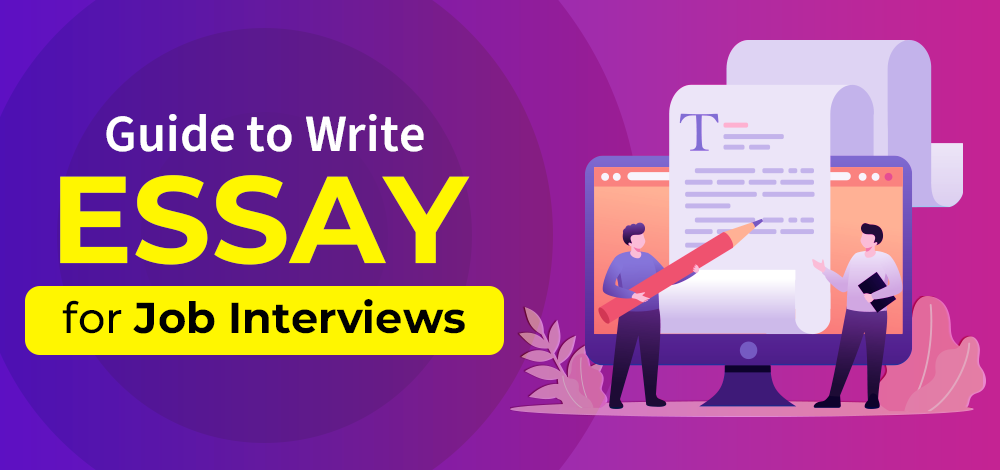
Things to remember about Essay Writing
- The essay must be organized and presented so that interviewer can follow it easily. It also needs to be neat and free of any ambiguity.
- The essay is not only a quiz on your understanding of specific facts. Your imagination, ingenuity, and ability to come up with original ideas will be put to the test. Hence, it must be written in an engaging, readable style. However, it must, most importantly, include your viewpoints on the matter at hand.
- Language proficiency does not develop immediately. It requires perseverance and effort. Your motivation to learn a language will impact how well you can communicate in it.
- In the wrong belief that we can produce a quality piece of work in the test room, many of us make the mistake of accumulating information and facts on the likely topics at the eleventh hour of preparation.
- What we must realize is that organizing information using the proper terminology will be a laborious task, especially under the strain of a deadline
- Improve your abilities by being enthusiastic about reading, taking an interest in expanding your knowledge base, and learning new words.
- The essay as a whole needs to flow naturally from one paragraph to the next so that the interviewer can sense the coherence, orderly flow, and arrangement of your ideas. Transitional words and phrases can be used to tie the paragraphs together.
Suggestions for Writing Effectively
Now let’s discuss some general ideas and tips for writing essays.
- Maintain proper structure: Start the essay with an introduction (or a problem), and then go on to give further information about the problem. The essay body should be between 86 and 90 percent in length, the introduction should be between 5 and 7 percent, and the conclusion should be between 5 and 7 percent.
- Don’t lose track of the subject: Remember the essay prompt. Remain focused on the topic. do not just cite examples or quotations and discuss side-events. Stay rooted in the problem or event you are discussing and then present your take on that very event.
- Practice is the key: Preparation is required before the examination phase to develop the ability to produce a decent essay. Writing is the key to a successful essay because it serves as the primary means of transferring thoughts from your head to paper. So don’t just read, start practicing writing essays before you write them for the real interview.
- Draw the readers’ attention: Your introduction’s opening line should spark the reader’s interest and stimulate their curiosity. When discussing a current affair or a political issue, it might be an intriguing question, a stunning reality, or a statement emphasizing the significance of the topic.
- Explain the background of your subject: The next step is to provide the context of the particular issue of current affairs or politics, so that the interviewer may grasp your argument. This may entail offering background information, providing an overview of the significance of discussions on the subject, and defining complex words. Don’t go into too much depth in the opening; you can go into more detail in your essay’s body.
- Be resourceful with your knowledge : In order to write a good article about current topics, you must understand that knowledge comes first. You need to know what is going on around you. Be precise when presenting your current affairs knowledge. Be precise in how you think about these incidents.

Mistakes to avoid in the Essays
You’ve probably got a clear idea about how to write an essay this far. That’s great! But you also need to be aware of the errors to keep away from. Your essays will be of much better quality if you can figure out how to avoid the following errors.
- Synthesis Writing, Not Analytical Essay Writing: If you’re writing about a current event, providing some background information can help to frame the subject. However, the majority of your essay should focus on your analysis. Don’t just summarise what happened.
- Too many arguments: The interviewer always expects you to provide solid justification for your thesis. Some people take this literally, and as a result, they write as many facts, figures, and quotations as they can. To make the thesis statement more credible, avoid adding unnecessary complexity to the article by making unrelated citings. Stick to the topic and state your case logically without factitively.
- Don’t sound contradictory: Be clear from the very first about your take on the event you are discussing. You may discuss different and relevant aspects of the issue you are discussing but don’t sound contradictory in the process. Don’t hold extremist opinions. Your essay should demonstrate how well-balanced, holistic, and analytical you are.
Useful Resources to learn about Current Events
Now, if you are wondering where and how to find the current events or relevant political issues that may be the potential topics of your essay, here are some cues for you.
- Consistency is necessary for the GA segment; daily newspaper reading is required.
- Keep concise records of significant news. The notes should be revised on a regular basis.
- Another way to stay up to date on current events is to subscribe to news networks or current affairs YouTube channels.
- You can read monthly magazines that are offered by different institutions if you don’t have time to read everyday current affairs. These periodicals can be found online and in PDF format.
So, these are everything you need to know about writing an essay on current and political issues; following the DOs and DONTs mentioned here you can create an excellent piece. But always keep in mind that before writing comes knowledge. There is no such thing as perfect writing but the more you are aware of your surroundings the easier it is for you to pen it down. Hence, keep reading, and stay updated to excel in your essay on such topics.

Similar Reads
- A Guide to Writing an Essay for Job Interviews Writing is a doorway into your mental perspective. Your written work will convey to the reader how you reason, how you debate, and how you support your point of view. This is why essays are integral parts of some job selection processes. The subjects and topics of these essays mostly revolve around 6 min read
- How to Effectively Use Storytelling in Job Interviews It can be difficult for applicants to distinguish themselves from the competition while preparing for interviews. Finding acceptable individuals after interviewing a vast pool of applicants is also difficult for the interviewers. Storytelling in job interviews is one way to help differentiate onesel 6 min read
- How to Make a Great Impression in an Interview? Nervousness, hesitation, and confusion, before an interview, are the most common symptoms. These are also somewhat required so that you don't go overconfident regarding your preparation. But confidence is a necessity. This comes when you have sweet blood and tears for the interview day. Interviews a 8 min read
- How to Answer "Why Should We Hire You" in an Interview? "Why Should We Hire You?" - Doesn't matter how confident you're in your knowledge and skillset during an interview, when the interviewer asks this simple yet prominent question, most of the time candidates end up giving a not-so-justifying answer to this question, especially when they're not already 8 min read
- Top 20 Strengths and Weaknesses for Job Interviews (2024) At some point in a job interview, you may be asked about your strength and weaknesses and you may notice your heart racing. 'How do I talk about my weak areas without looking terrible for the job role or speak about my strengths without bragging?' Yes, it’s a tricky one, not only for freshers but fo 14 min read
- How to Talk About Your Achievements in an Interview? You were applying for the job for a long time and finally, your resume is shortlisted now. You must be sweating with nervousness because it's the time for your interview but it's just a cakewalk with the right practice. Behavioral questions play a crucial role in your hiring process. It helps the in 6 min read
- How to Answer "Tell Me About Yourself" in an Interview? Regardless of any job profile or any company - 'Tell Me About Yourself', is undeniably the very first question that you often face in every interview. The question allows you to showcase your personality to the recruiters and let them know how you are a perfect fit for the particular job role. This 9 min read
- 15 Common Job Interview Mistakes to Avoid An interview is a gate towards your path to achieving a successful career. Whether you are a technician with years of experience looking for a higher role or a fresh graduate looking for a great start to your career, you are bound to face the interviewer and show your skill set. You must have gone t 8 min read
- 25 Questions to Ask in An Informational Interview Information interviews are a great way to learn from people who have already achieved success in the field that you are interested in. By asking the right questions, you can gain valuable insight into the industry and uncover new opportunities. By taking part in an informational interview, you can l 7 min read
- 20 Smart Questions to Ask in an Interview If you've ever faced any interview then you must have heard this line from the interviewer - Do you have any questions to ask? Indeed, an interviewer expects you to ask several worthwhile questions to determine your interest and zeal toward the job opportunity. Moreover, asking relevant questions to 8 min read
- How to Answer "What Are Your Career Goals" in Interview? In an interview, you'll frequently hear, "What are your career goals?" And you need to be ready with a response since hiring managers ALWAYS favour candidates who can demonstrate that they are goal-oriented and have long-term professional aspirations. Discovering your career goals will be asked duri 8 min read
- How to Face an Interview Confidently (12 Best Tips) Indeed, from the moment when you enter the interview room for an in-person interview or log in to the portal for an online interview, you often start to feel stressed and get into the nervous zone. Moreover, despite possessing all the required learnings & skills for the respective job profile, m 8 min read
- Article Writing Format: Objective and Steps Writing is an art, and you might want to write like your favorite authors. To share your thoughts by writing. It can be a book, journal, article, blog, or online post. Writing might seem hard at first, but with the right guidance, anyone can learn. Basic writing skills and topic knowledge are all yo 7 min read
- 50+ Common Interview Questions and Answers Common Interview Questions: Preparing for a job interview can be daunting, but being well-prepared can significantly boost your confidence and chances of success. To help you ace your next interview, here is a list of the Top 50 common interview questions for freshers/college students or experienced 15+ min read
- 9 Things That You Should Research Before Your Interview Nothing is more disappointing to an interviewer than finding out that an applicant knows nothing about the company that they’re trying to work for. Put yourself in their shoes: Would you want to hire someone who is just blindly sending their résumés to companies they have no real interest in? Interv 8 min read
- 20 Top Situational Interview Questions and Answers Situational interview questions are a great way for employers to evaluate how you handle real-life work scenarios and challenges. These questions often explore key areas such as leadership, conflict resolution, time management, and team collaboration. To tackle them effectively, using the STAR metho 8 min read
- Top 25 HR Interview Questions and Answers [2025 Updated] HR interviews can be daunting but they don’t have to be. The bottom line in most hiring processes entails testing the personality of a candidate for their communication traits and company culture fit. Be at the initial or experienced levels of your career being prepared for commonly asked interview 15+ min read
- TCS Digital Interview Experience (On-Campus Virtual 2020) I'm from a Tier 2 college in Computer Engineering Branch. I gave one aptitude and one coding test at college level which made me eligible for this interview. Note that the aptitude test was not an eliminator, all students had to give both tests and combined results were used for shortlisting student 5 min read
- How to Use the STAR Method To Ace Your Job Interview? Are you one of those people who gets jittery when it comes to answering behavioral interview questions in a proper manner that can actually impress the interviewer? If your answer is yes, this article is curated just for you. Long gone are the days when the "Tell me about the time when..." type of q 7 min read
Improve your Coding Skills with Practice
What kind of Experience do you want to share?

Interview Essay
Interview essay generator.
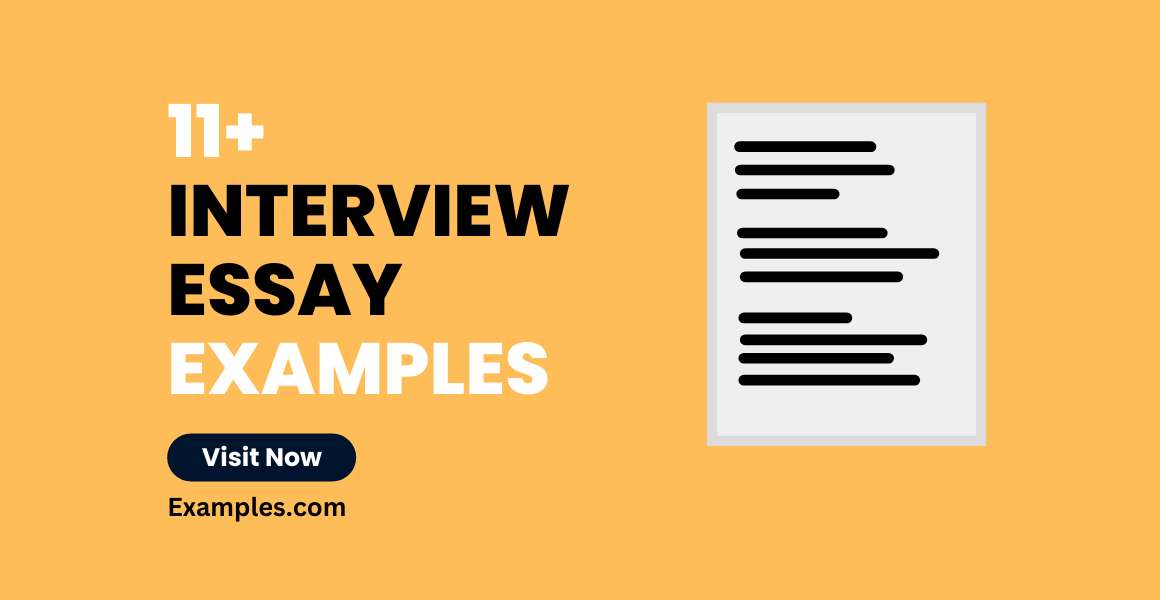
Essay writing is different for everyone. Some people choose to go to the library and search for facts on a given subject, while others like to focus on gathering information through personal statements .
During this interview process, interviewers typically ask a series of interview questionnaire that their readers may want to know about. These details are either recorded or jotted down by the interviewee. With what has been gathered, an individual may then write a complete essay regarding the exchange.
Interview Essay Sample
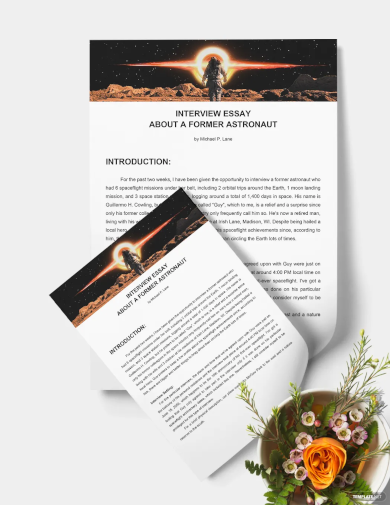
- Google Docs
Size: 168 KB
Personal Interview Essay Template
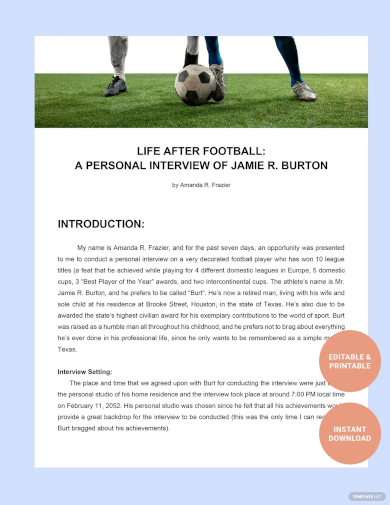
Size: 136 KB
Nursing Interview Essay Template
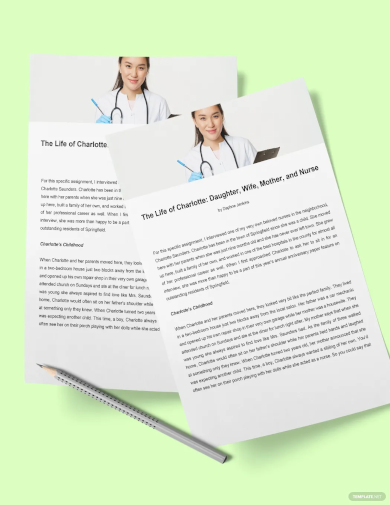
Size: 123 KB
Leadership Interview Essay Template
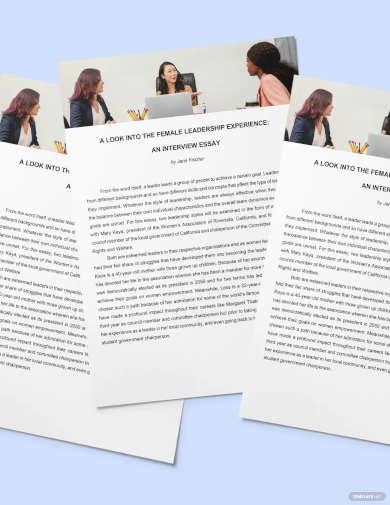
Size: 154 KB
Teacher Interview Essay Template
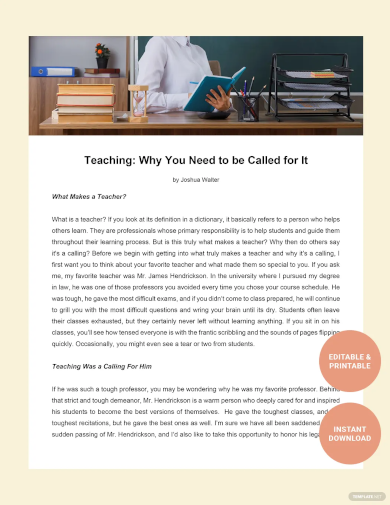
Size: 150 KB
Job Interview Essay Sample
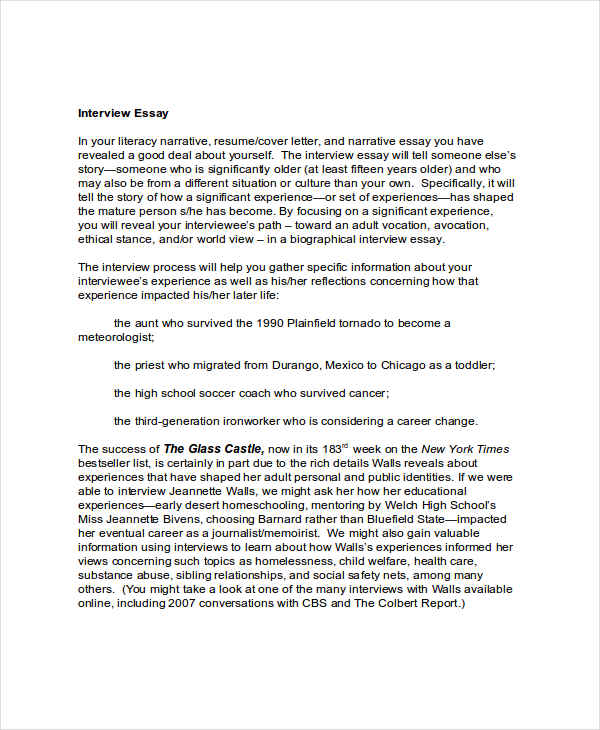
Narrative Interview
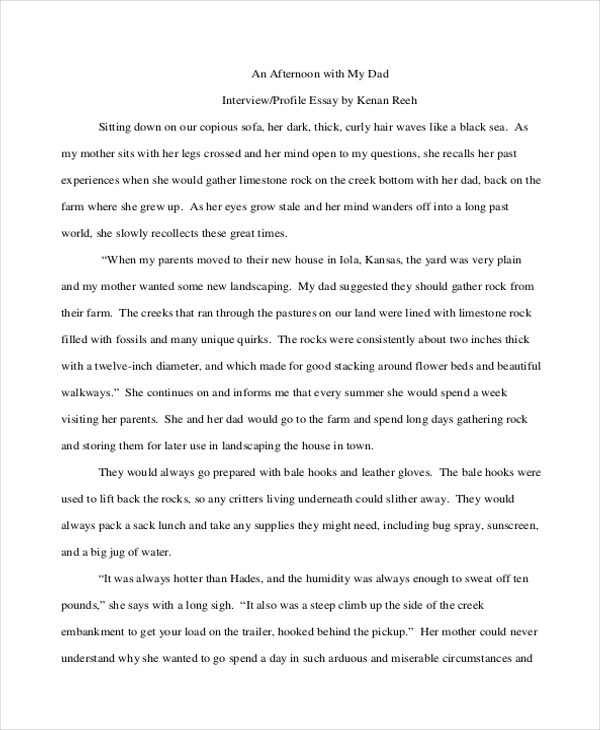
Size: 70 KB
Career Interview Essay
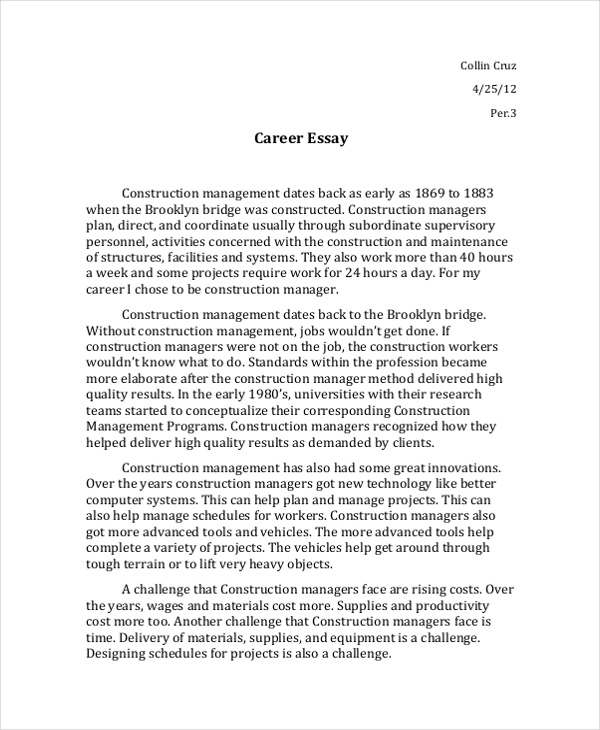
Size: 29 KB
What Is an Interview Essay?
Interview essays are typically based on research gathered from personal testimonies. This could be based on one’s personal experiences or their own input on a given matter. It may be informative essay , descriptive essay , or even persuasive essays , depending on the questions asked by the interviewer.
The content of the essay may include direct quotes from the interview or it may come in a written narrative form. Through this, we are able to gain additional information from a particular perspective.
What to Include in an Interview Essay
For every essay, a thesis statement is needed to help your readers understand the subject being tackled in your work. For an interview short essay , you would need to talk about your interviewee. Any information that will create a credible image for your interviewee will be necessary.
Next, it’s necessary to include the significant ideas that you have acquired from your interview. Ideally, you should pick three of these ideas, elaborate what has been said, and present it in paragraphs. Be sure to emphasize these points in a detailed and concise manner, a lengthy explanation might be too redundant. You may also see sample essay outlines .
Leadership Essay
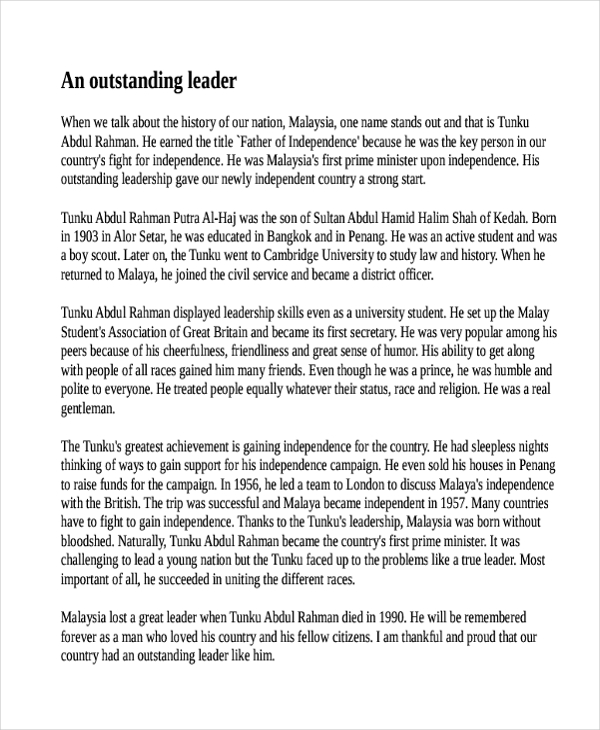
Size: 24 KB
Nursing Interview Example
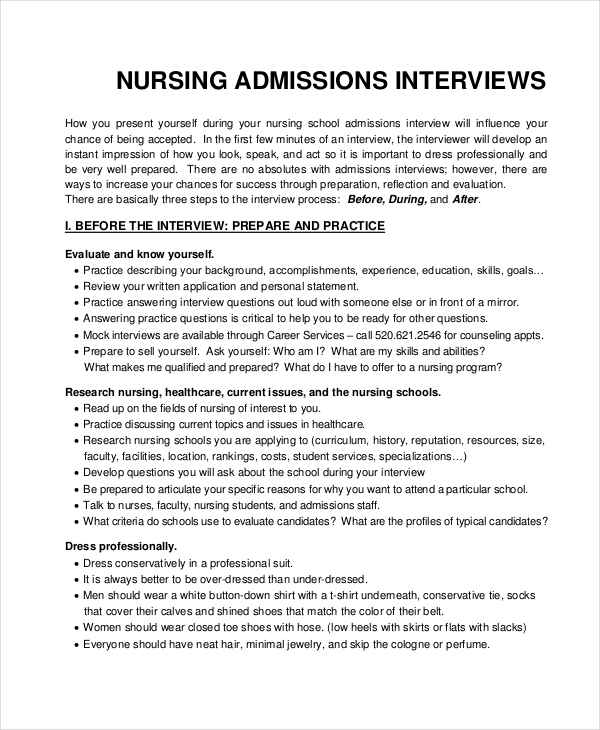
Size: 146 KB
Personal Interview
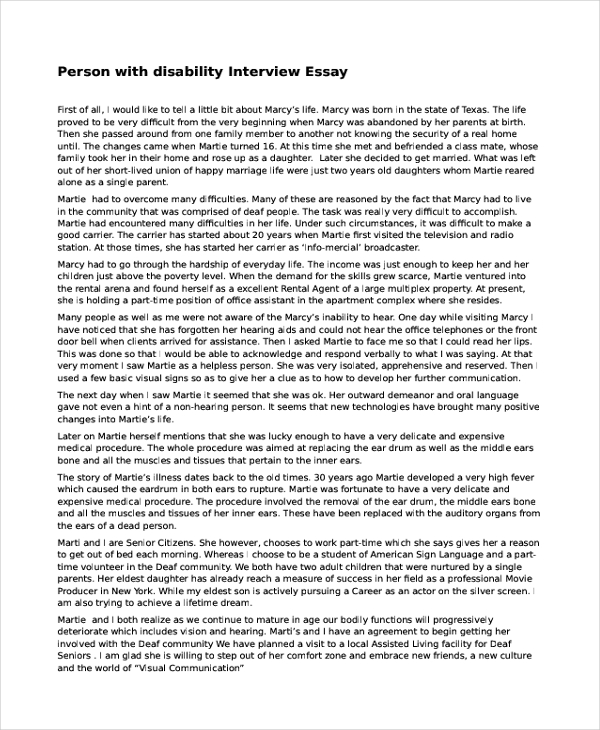
Size: 18 KB
Parent Interview Sample
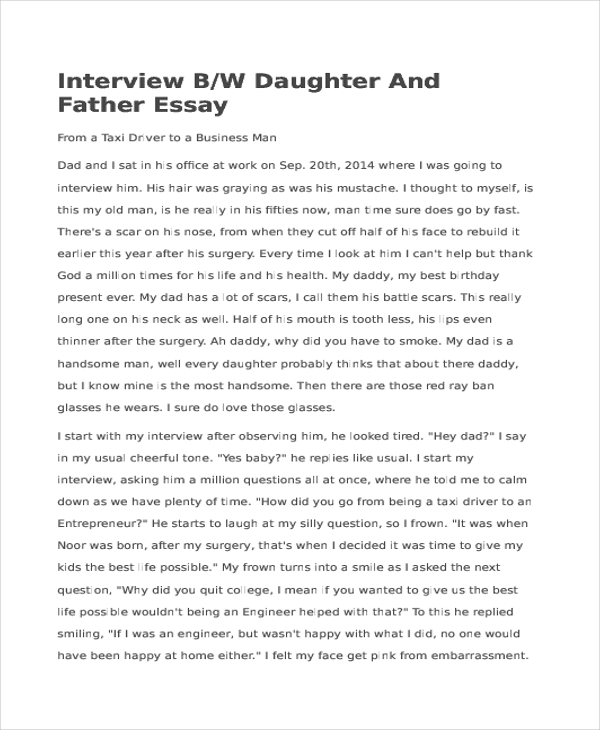
Size: 15 KB
Guidelines for an Interview Essay
When writing an interview essay, it would be best to create an outline first.
Organize the information you have gathered from your interviewee and structure it in a logical order. This could be from one’s personal information to the most compelling details gathered. Be reminded of the standard parts of an essay and be sure to apply it to your own work.
Even when most, if not all, of your essay’s content is based on what you have gathered from your interviewee, you would still need to create a good starting of essay and end to your essay.
Additionally, do not forget to put quotation marks around the exact words used by your interviewee. It would also be best to proofread your work and make sure that there is a smooth transition for each thought. You may also like personal essay examples & samples.
How to Conclude an Interview Essay?
You can end your interview essay how ever you wish to do so. It could be about your learning from the interview, a call to action, or a brief summary writing from what has been expressed in the essay.
But keep in mind, this would depend on your purpose for writing the essay. For instance, if you interviewed a biologist to spread awareness about mother nature, then it would be best to conclude your essay with a call to action. Knowing this, it’s important to end your essay well enough for it to be memorable.
Text prompt
- Instructive
- Professional
Write an Interview Essay on a local community leader.
Discuss the career journey of a teacher in your Interview Essay.
- PRO Courses Guides New Tech Help Pro Expert Videos About wikiHow Pro Upgrade Sign In
- EDIT Edit this Article
- EXPLORE Tech Help Pro About Us Random Article Quizzes Request a New Article Community Dashboard This Or That Game Forums Popular Categories Arts and Entertainment Artwork Books Movies Computers and Electronics Computers Phone Skills Technology Hacks Health Men's Health Mental Health Women's Health Relationships Dating Love Relationship Issues Hobbies and Crafts Crafts Drawing Games Education & Communication Communication Skills Personal Development Studying Personal Care and Style Fashion Hair Care Personal Hygiene Youth Personal Care School Stuff Dating All Categories Arts and Entertainment Finance and Business Home and Garden Relationship Quizzes Cars & Other Vehicles Food and Entertaining Personal Care and Style Sports and Fitness Computers and Electronics Health Pets and Animals Travel Education & Communication Hobbies and Crafts Philosophy and Religion Work World Family Life Holidays and Traditions Relationships Youth
- Browse Articles
- Learn Something New
- Quizzes Hot
- Happiness Hub
- This Or That Game
- Train Your Brain
- Explore More
- Support wikiHow
- About wikiHow
- Log in / Sign up
- Education and Communications
- College University and Postgraduate
- Academic Writing
How to Write an Interview Essay
Last Updated: March 11, 2024 Fact Checked
This article was co-authored by Diane Stubbs . Diane Stubbs is a Secondary English Teacher with over 22 years of experience teaching all high school grade levels and AP courses. She specializes in secondary education, classroom management, and educational technology. Diane earned a Bachelor of Arts in English from the University of Delaware and a Master of Education from Wesley College. This article has been fact-checked, ensuring the accuracy of any cited facts and confirming the authority of its sources. This article has been viewed 468,913 times.
An interview essay is designed to give the reader a general impression of the interview subject and to present their thoughts on a select group of topics. It also offers the opportunity to develop deeper insights by analyzing the interviewee's responses within a larger context. Interview essays are a common school assignment, and provide useful skills for those interested in journalism, or just being good writers in general. There are several formats that fit into the category, but a good interview essay of whatever type can make the reader feel as though they were asking the questions.
Interviewing for an Essay

- If your essay is to be a factual piece, you'll want to interview someone who has expertise in the subject matter you'll be addressing. If your paper is about a science topic, you'll want to interview a scientist in that field. If your paper is about a period of history, you'll want to interview either a historian or someone who's lived through that period of history.
- If you plan to make your essay an opinion piece, you'll likely want to interview someone who has a strong opinion about the topic covered in your essay. Ideally, you want someone who can express opinions articulately, and who also has credentials in the area you plan to write about.
- If your piece will have a narrow perspective, you'll need to interview only one or two people. If your piece will present a general consensus, you'll need to interview more people, probably with varying expertise and credentials.

- When available, read works about and works written by your subject, both in print and online. At the same time, research the topic associated with your subject. The more you know about both, the more intelligent questions you can ask.
- Look for previous interviews your subject has given, as well. These will give you an idea of what questions the person has been asked before, so you can decide on appropriate subjects for your own questions, including questions that no one else has asked.
- Questions that require "yes" or "no" answers are good for gathering specific factual information; open-ended "how," "why," and "tell me about" questions are great for gathering additional background material not found in your research.
- Draw up a list of the questions you are prepared to ask. Have more questions ready than you will likely use, so that you can make adjustments as the interview takes place. (For instance, your subject may begin focusing on what you thought was a side topic, but turns out to be the key part of your interview.) Rank your questions in order of importance to make sure you ask your best ones, or list them all in the order you'd ask them and color-code the most important ones.

- Choose a quiet place with few distractions for your interview site. A library, restaurant, or campus location if you're doing this for a college writing class would be suitable.
- You may want to get the interviewee's consent to use their comments in your essay in writing, as well as permission to record those comments during the interview. By law, if you are recording an interview conducted over the phone, you must obtain written permission. [4] X Trustworthy Source University of North Carolina Writing Center UNC's on-campus and online instructional service that provides assistance to students, faculty, and others during the writing process Go to source
- It's helpful to have a backup interviewee in case the person you plan to interview can't make it.
- Be on time at the place you've agreed to meet for the interview.

- Using a recording device (with permission) is almost always advisable, as it permits you to save your note-taking for jotting down your insights on contexts, themes, how your subject approaches the questions, his/her comfort level, and so on.
- Be patient and respectful as you ask your questions and wait for responses. Give the interviewee time to reflect, and you will likely be rewarded with more insightful answers. A few deeper responses are usually better than many superficial ones.
- Immediately after the interview, write down your thoughts and impressions about the interview and interviewee. They may help you shape the essay.
- Always end the interview by thanking the person.
Writing the Essay

- Narrative format. This form allows paraphrasing of some information the interviewee says, along with direct quotes for the material you most want to emphasize. This is the most likely format for a class assignment, and offers the most opportunity to add context and analysis.
- Conversational format. This is a looser format than the formal writing style required for most essays. You can address the reader directly and use both first and second person. This format can be suitable for anything from class assignments to magazine articles.
- Question-and-answer format. This form presents your questions to the interviewee, followed by the interviewee's responses. (That is, the text looks something like this: (Your Name): How long have you been in the circus? (Interviewee's Name): About 35 years.) These are always direct quotes, although you may insert explanatory material in parentheses and substitutions, such as a person's name in place of a personal pronoun, in brackets. This format is best suited for essays with only a single interviewee or a closely related group, such as spouses or the core cast of a TV show.
- Informative format. This format usually interweaves the interview with research you've done on the subject, incorporating some of that research in the text to provide background and give it a little more color.

- Read over your interview notes and listen to any audio / video recordings you have. Utilizing both whenever available will allow you to thoroughly consider both the highlights of the interview and the most significant themes to emerge from it. These, in turn, will inform your outline of what information your essay will cover and how it will appear. [9] X Research source
- One possible outline could be an introduction that starts with an anecdote about the interviewee and then presents your thesis statement, several key points that support the main focus, and a conclusion that summarizes the information presented. Traditional school essays often utilize a five paragraph format (introduction, three supporting paragraphs, conclusion), and this can often work with interview essays as well.

- If, however, the purpose of your essay is to use your interviewee's comments to support a position or examine a larger theme, your thesis will probably be a statement of that position or theme, with the interview / interviewee placed within that context. For instance: "John Doe's mixed feelings of pride and betrayal reflect those shared by many Vietnam veterans still with us."
- Regardless of essay format, make your thesis clear and concise, and be sure that the remainder of your essay refers back to it. See How to Write a Thesis Statement for more advice.

- Interviews can sometimes produce a good deal of repetitive answers (even with high-quality questions), so you may need to trim repetitions and unnecessary elements from the body of your essay. Make sure that whatever material you do keep remains true to both the spirit of the interview and the overarching focus of your essay. [10] X Research source
- A handout from the Writing Center at the University of North Carolina (available at http://writingcenter.unc.edu/handouts/oral-history/ ) provides a wealth of valuable materials on interview essays. It includes, for instance, examples of how to utilize the same interview materials in a transcription (question-and-answer format), a presentation of individual experiences (quotations and paraphrases), and the placing of the interview / interviewee in a larger context (paraphrasing and quotations with ample explanation).

- Reading over the essay yourself is a good start, but it is always wise to have another set of eyes look it over as well. Another reader is likely to catch errors, repetitions, and unclear sections that you have glossed over. [12] X Research source
- Go back to your original interview notes, recordings, and transcripts, and make sure that your essay continues to reflect the actual interview. Layers of editing and revising can sometimes cause the essay to drift away from the original source and intent. You may even want to let the interviewee read it over to ensure that it captures their voice. [13] X Research source

- Any materials you used for research, information about the interviewee, or context for the essay itself should be referenced in the approved citation format for your essay.
- Make sure one more time that any direct quotations from your source are placed in quotation marks, and any paraphrasing is done without quotation marks. Don't put words in your subject's mouth, and respect the words that do emerge from it.
What Are The Dos And Don’ts Of a Journalistic Interview?
Expert Q&A

- After the interview, send the interviewee a written thank-you note expressing your appreciation for their time. Thanks Helpful 0 Not Helpful 0
- If the person you're interviewing is busy or elderly, you may want to plan for more than one interview session. Observe the interviewee for signs of impatience or fatigue. Conduct multiple, shorter sessions if necessary. Thanks Helpful 0 Not Helpful 0

- If you plan to interview someone over the telephone, permission to record the conversation is required by law. Thanks Helpful 15 Not Helpful 3
You Might Also Like

- ↑ http://writingcenter.unc.edu/handouts/oral-history/
- ↑ https://www.indeed.com/career-advice/interviewing/interview-paper
- ↑ http://www.whatkidscando.org/featurestories/2007/maine_students/tip_sheets/FIRST-PERSON%20ESSAYS%20TIP%20SHEET.pdf
- ↑ http://www.brighthubeducation.com/help-with-writing/97515-how-to-write-an-interview-essay/
- ↑ https://owl.purdue.edu/owl/general_writing/the_writing_process/proofreading/proofreading_suggestions.html
About This Article

To write an essay from an interview, you’ll first have to decide on the format the essay will take, as this will determine the structure and what you write. The most common form is the narrative format, in which you use direct quotes and paraphrase your subject to add context and detail, or you can write in a more conversational tone, or even in a directly transcribed question-and-answer form. Once you decide on format, plan an outline by forming a central thesis, which will be the central statement your essay is making. Add onto the outline by drafting supporting evidence directly from the interview and from other sources, like books, newspaper articles, other essays, anything else to support your point. Write and finish the essay by combining information from the interview and other sources with your own explanations and words. To learn about how to conduct the interview to get enough information to write about and how to finish the writing process, keep reading! Did this summary help you? Yes No
- Send fan mail to authors
Reader Success Stories
Oct 19, 2016
Did this article help you?
Tyler Jordan
Sep 11, 2016
Tawana Moos
Nov 20, 2017
Mar 28, 2016
David Mcaniel
May 23, 2017

Featured Articles

Trending Articles

Watch Articles

- Terms of Use
- Privacy Policy
- Do Not Sell or Share My Info
- Not Selling Info
wikiHow Tech Help Pro:
Develop the tech skills you need for work and life

IMAGES
COMMENTS
Jul 30, 2024 · The purpose of an interview essay varies depending on the situation. For example, an interview essay that focuses on an individual who experienced a historical event is different from an interview essay that focuses on the life of a social media influencer. This kind of writing is most common in academic settings and both casual and formal ...
Apr 19, 2024 · Writing an interview essay can seem daunting, especially when you're unsure where to start or how to make it engaging. An interview essay should effectively present the interviewee's thoughts on selected topics, using a structured format that combines direct quotes, paraphrasing, and your own analysis to enrich the content.
3 days ago · Writing the Interview Essay. In writing an interview essay, readability is always the key! It’s true, especially when working on an interview essay or going for a job interview. The actual writing part must not include every single point or a reply that has been collected. You must make it readable and choose only the strong points.
Sep 22, 2022 · Now let’s discuss some general ideas and tips for writing essays. Maintain proper structure: Start the essay with an introduction (or a problem), and then go on to give further information about the problem. The essay body should be between 86 and 90 percent in length, the introduction should be between 5 and 7 percent, and the conclusion ...
Jun 20, 2017 · Guidelines for an Interview Essay. When writing an interview essay, it would be best to create an outline first. Organize the information you have gathered from your interviewee and structure it in a logical order. This could be from one’s personal information to the most compelling details gathered.
Mar 11, 2024 · An interview essay is designed to give the reader a general impression of the interview subject and to present their thoughts on a select group of topics. It also offers the opportunity to develop deeper insights by analyzing the interviewee's responses within a larger context.